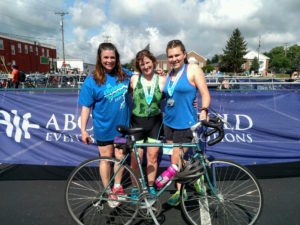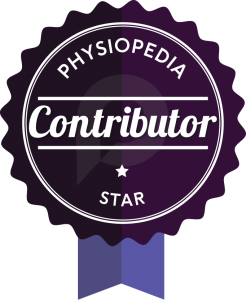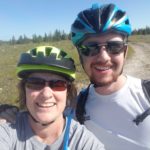Please celebrate with us the top contributors for April – Selena Horner ! Selena is a dynamic team player who mainly works with the social media aspect of Physiopedia. She awakens Physiopedia with her commitment, her endless contributions and her positive attitude to life. Selena unconditionally passes on to knowledge users, volunteer colleagues, contributors and the organization as a whole. Well done, Selena, you really deserve the Top Contributor award for April 2020.
Your name: Selena Horner
Time active with Physiopedia: Since April 2015.
Current role at Physiopedia: Social Media Specialist.
Where did you go to university? Bachelor's degree: Central Michigan University with a major in sports medicine and a minor in mathematics; Master's degree in Physiotherapy: Grand Valley State University .
Where do you work? United States of America; Private practice; state-certified clinical specialist in geriatric physiotherapy by the American Board of Physical Therapy Specialties since 2003.
Describe your role: I wear several hats as the owner of a private practice. My clinical role focuses on the treatment of older adults in shared apartments. My marketing strategy is aimed at people who are at risk of falling .
What is the most rewarding part of a physiotherapist? The best part is working with patients and being amazed at their performance: literally watching how their balance improves .
What are some of the more difficult aspects of being a physical therapist? Deciding to do the right thing is always a challenge. It takes courage to put every patient and their specific needs in the foreground. Regardless of what's going on in the world or which leaders are announcing the truth, the challenge is to always understand, research and understand the situation and take the best action for each patient. Patients trust us and look for answers in their physiotherapy care. As I write this, the world has been turned upside down by COVID-19 . I am disappointed with some leaders and influencers in this profession who choose to increase profits and business over the health of patients and clinicians.
What are some of your professional passions? Believe it or not, this profession really wasn't the one I really wanted. I love math. I really, really wanted to be a biomedical engineer. I started a path that should lead me to design and evaluate lower limb prostheses. Obviously that didn't happen. Instead, I "settled in" with this profession. I knew I could do it. At that time, it had a decent return on investment. When I end my career, I'm finally really enjoying myself. Since I have my practice, I can create the desired environment. I have a treadmill with power platforms. I suggest and beta test changes for this device. I have video cameras that save 100% of the time in the cloud in case I need to analyze movement patterns or show the patient their performance. In May I will have a fair bit of technology to give me information about the gait characteristics above the ground. For the first time, I can grasp the soil properties precisely before the treatment begins. I will be able to play with comparing reports of the treadmill platform with walking above the ground. I can then use this patient-specific information to drive treatment interventions and strategies to normalize movement patterns.
What are some of your personal passions? I enjoy gardening over several years. I spend hours and hours outside from May to October. I have no talent when it comes to being an artist, but these gardens look like a work of art. I like to bake and give my husband cakes, cupcakes, muffins or bread almost every week so that he can take him to his work place. Since my heart is racing at low intensity during physical activities, I no longer do triathlons. I switched to relay teams and love to swim my heart for my team. I fell while mountain biking and although I really enjoy it, I'm a lot shy than I was a few years ago.
What would you advise a  newly graduated physiotherapist to do? Really improve your skills: listening and communicating. Growth requires an uncomfortable feeling. Be ready to change your treatment plans quickly as you learn new things. Doing so will make you feel uncomfortable. Be honest with these feelings and convey them to your patients. Your patients will respect you for your honesty and trust you even more. Question, think critically and reflect on yourself. The literature has shown that an experienced physiotherapist focuses on the patient: what the patient thinks and says and really works with the patient. Strive for patient-centered care.
newly graduated physiotherapist to do? Really improve your skills: listening and communicating. Growth requires an uncomfortable feeling. Be ready to change your treatment plans quickly as you learn new things. Doing so will make you feel uncomfortable. Be honest with these feelings and convey them to your patients. Your patients will respect you for your honesty and trust you even more. Question, think critically and reflect on yourself. The literature has shown that an experienced physiotherapist focuses on the patient: what the patient thinks and says and really works with the patient. Strive for patient-centered care.
Where do you see yourself in 5 years? I will be close to retirement. I am really looking forward to continuing and removing physiotherapy from my life. Maybe open a small café? Maybe change and work with my husband? I have no idea – but something where I don't have to look at the clock when I spend time with others.
 What is the best thing about being a Physiopedia volunteer? I volunteer for a variety of groups in different roles. The only thing I love about the Physiopedia team: Things get done! The team is really a team. The team changes constantly, is global (all these time zones) and yet tasks are completed very promptly. The team members do not need babysitting or nudging. Every team member really shows responsibility and accountability. The most recent example was a few weeks ago with the COVID-19 course program. Many team members gave up their plans and worked to find resources and create content for the course that went online 4 days later (wow!). The Physiopedia team culture is something that is great for other volunteer organizations.
What is the best thing about being a Physiopedia volunteer? I volunteer for a variety of groups in different roles. The only thing I love about the Physiopedia team: Things get done! The team is really a team. The team changes constantly, is global (all these time zones) and yet tasks are completed very promptly. The team members do not need babysitting or nudging. Every team member really shows responsibility and accountability. The most recent example was a few weeks ago with the COVID-19 course program. Many team members gave up their plans and worked to find resources and create content for the course that went online 4 days later (wow!). The Physiopedia team culture is something that is great for other volunteer organizations.
How did it help you to advance your professional development / career as a volunteer at Physiopedia? My role at Physiopedia really didn't help my career. It has helped with professional development. There are pages and pages of content that I want to share. To create something for social media, I try to find something that is interesting to share within the content. The aim is that those who use social media click on the link, learn more and grow professionally.
What are your hopes and aspirations for Physiopedia? I donate my time because I believe in the value that Physiopedia brings to #globalPT. I remember the time it took me to write my thesis. What happened to it It stands undisturbed and unopened on a shelf. I hope academics will start using Physiopedia to create content as part of the physiotherapy program. The created content is not on a shelf. Instead, this content will serve as a resource for others around the world. I also like how Physiopedia created a branch: Physioplus . Physiotherapists have access to a variety of online courses for a minimal subscription fee. The fantastic thing about it: the courses are led by researchers all over the world. I don't know of any other resource that has this diversity.
What is your favorite course on Physioplus? Oh, honey … I'm just being honest. I can't handle online courses well. I can't seem to finish a course. I make terrible at conferences on a single topic. My learning style requires live interjections. I learn from questioning and whispering thoughts with someone sitting next to me. I am also what I would consider a patient-oriented learner. My learning style is goal-oriented and completely focuses on the questions I have with my live patient load. I am probably the only volunteer who has not completed a Physioplus course. For some reason, I don't have the attention span for formal online learning courses. (And it's not just Physioplus: every online course I've tried doesn't suit me.) I have to say I loved the Volunteer Orientation Course . I think the reason I liked it was that I didn't have to sit and listen much. I was busy with tasks. I am energized when I am given a task. I feel for all students around the world who are currently fully immersed in online courses.
Do you have anything else to say?  It was both a pleasure and an honor to serve on the Physiopedia team. Rachael and Tony brought their original vision to life. Not only did you stop here, your vision has evolved. I am surprised at how strong the support network that Rachael and Tony have created worldwide. Cheers to them and so many people around the world who have either worked or donated financially to support the cause of a free wiki for physiotherapists.
It was both a pleasure and an honor to serve on the Physiopedia team. Rachael and Tony brought their original vision to life. Not only did you stop here, your vision has evolved. I am surprised at how strong the support network that Rachael and Tony have created worldwide. Cheers to them and so many people around the world who have either worked or donated financially to support the cause of a free wiki for physiotherapists.